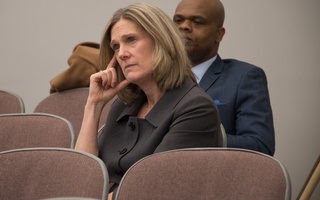{shortcode-593d4b2b7f990e062ce28b2cc57c95d155bdcbb2}
Confusion about the College’s various efforts to curb the influence of single-gender social groups on campus has snarled this month’s roll-out of the College’s historic penalties on members of those organizations.
In May 2016, the College unveiled penalties for members of single-gender social groups, barring them from campus leadership positions, athletic captaincies, and certain post-graduate fellowships. Those sanctions have taken effect and apply to the Class of 2021, which arrived on campus earlier this month.
Since then, administrators and faculty have tried to revise the sanctions at least twice: First by strengthening the policy, and then by recommending it be repealed and replaced by a complete ban on Harvard social groups.
These proposed revisions have left some newly-arrived students ignorant of the rules that apply to them and forced administrators to play catch-up as they develop and discard mechanisms to enforce an ever-shifting goal.
Employees in the Office of Student Life developed an online affirmation that required undergraduates to certify they were not members of single-gender social groups before registering as leaders of student organizations.
Titled “Single-Gender Social Organization Certification” and labeled “REQUIRED,” the document asked students to check a box certifying they “understand the contents of this policy” and are not “member[s] of a single-gender social organization,” according to a copy of the affirmation obtained by The Crimson.
But Office of Student Life staffers later canceled the digital affirmation after learning the penalties might be revised, according to Assistant Dean of Student Life Alex R. Miller.
“As part of its internal administrative processes, the College developed a draft certification form,” Miller wrote in an emailed statement. “The draft form… was initially proposed in 2016 for consideration, but never implemented.”
Instead, Dean of the College Rakesh Khurana attempted to ensure new students understood the policy and its consequences via his welcome email, sent to freshmen on August 16. In the email, Khurana explained the social group penalties and invited students to contact the Office of Student Life if they had additional questions.
Still, widespread confusion about the policy exists among freshmen—the first members of the College to be affected. Of roughly two dozen first year students walking to eat lunch in Annenberg Tuesday, all said they were unsure of the policy’s current status. Some appeared to mix up the original penalties with the proposed social group ban.
“I don’t know exactly what they are,” said Phil A. Labrum ’21, referring to the penalties.
“I haven’t looked a lot into it,” said Braeden J. Foldenauer ’21.
Despite the uncertainty, data gathered in The Crimson’s annual survey of the incoming class indicate that the rollout of the policy may have had some effect—roughly 30 percent of surveyed freshmen indicated that they now had a less favorable opinion of final clubs because of the proposed social group ban, while 4 percent said they had a more favorable opinion.
The Class of 2021 also expressed a higher level of disinterest in joining social groups than any other incoming class surveyed in the last four years. Forty-one percent of surveyed students in the Class of 2021 indicated that they were “not at all interested” in joining a final club or Greek organization, as compared to 29 percent of the Class of 2020, 25 percent of the Class of 2019, and 23 percent of the Class of 2018.
—Staff writer Hannah Natanson can be reached at hannah.natanson@thecrimson.com. Follow her on Twitter @hannah_natanson.
—Staff writer Derek G. Xiao can be reached at derek.xiao@thecrimson.com. Follow him on Twitter @derekgxiao.
Read more in News
Beloved Corner Store Louie’s Up for Sale
















